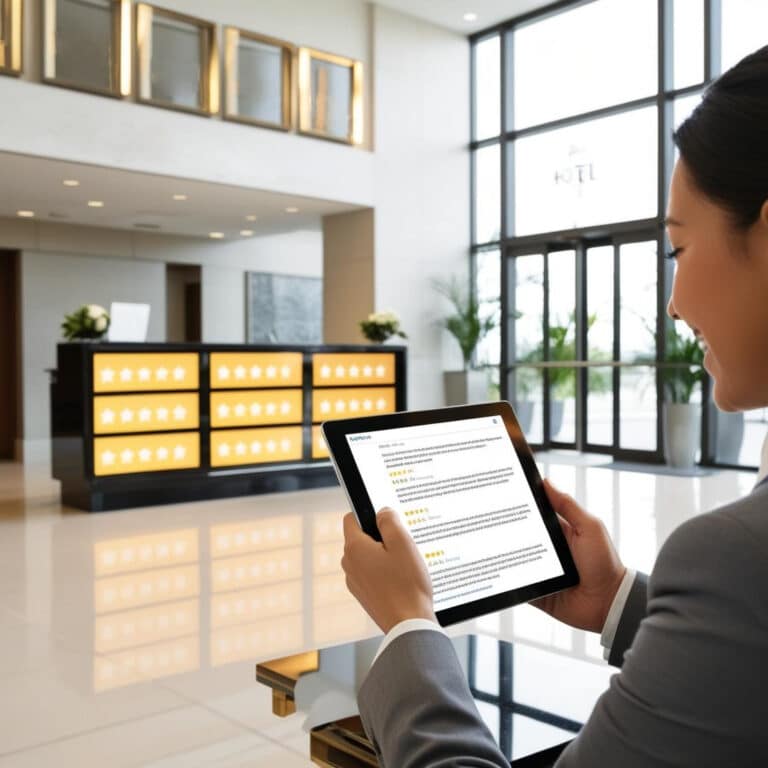
Online reputation is the image that your hotel reflects on the Internet. It has become a key factor in attracting and retaining customers. A good reputation leads to more bookings and increased loyalty, while a negative reputation can quickly hinder the growth of your establishment. This article explores how to effectively manage your hotel’s online reputation through practical strategies and the use of CRM tools.
1. Understanding online reputation
Online reputation could be define as the perception that customers have of your hotel on the Internet. It is built up through reviews left on platforms such as TripAdvisor, Google and Booking.com. There are more than 500 review platforms in the world. This can represent a major challenge for hoteliers who have to monitor and manage their reputation across so many different sites, some of which are even specialised for specific countries or targets. A good reputation is crucial to turning travellers’ curiosity into direct bookings. Reviews posted on these platforms are often the first datas that travellers are consulting when they are choosing their accommodation! This means that positive reviews increase confidence in the intention to buy, while negative reviews can potentially dissuade new customers. Understanding the importance of this reputation is the first step in any improvement strategy.
Review platforms play a key role in building your online image. Travellers frequently consult these sites before finalising a booking. That’s why it’s essential to maintain a good reputation on these platforms to positively influence their decision. Experience CRM can help by centralising these reviews and making them easier to manage. Dealing with reviews on so many platforms can be overwhelming without the right tools, underlining the importance of an effective solution such as Experience CRM.
2. Strategies to improve online reputation
Active solicitation customer reviews
Encouraging satisfied customers to leave positive reviews is essential. Some techniques include the possibility for hotels to offer a bonus to the receptionist when their name is mentioned in the review left by the customer, creating a sense of personalisation and thanks.
However, despite their usefulness, these traditional techniques are insufficient to effectively manage the volume and diversity of reviews. Experience CRM makes it possible to automate the sending of post-stay feedback requests, thereby increasing the volume of positive feedback. For example, a few days after their departure, customers can receive an e-mail inviting them to share their experience on specific platforms. The automated management offered not only makes it possible to request reviews systematically, but also to access the data collected from different platforms.
Proactive management of negative reviews
Responding quickly and strategically to negative reviews can mitigate their impact. By using dedicated software, teams can be instantly alerted to new reviews, enabling them to respond quickly. Working hard to respond to negative reviews is crucial, not least to defuse issues, which is a real challenge for hoteliers. Turning a negative experience into an opportunity for improvement shows that you are listening and care about customer satisfaction, improving the positive perception of your establishment.
Fortunately, solutions exist to help overcome this challenge. The use of artificial intelligence (AI) in systems such as Experience CRM can facilitate the generation of appropriate and personalised answers, making the management of feedback less tedious and more efficient. This technology makes it possible to process large volumes of feedback quickly while maintaining a high level of personalisation and relevance in answers.
Improving the customer experience
Customer feedback provides valuable information that can be used to refine your hotel’s offering. By incorporating these suggestions into your improvement strategy, you show travellers that their opinion counts, which can boost loyalty. Attention to detail and personalisation are key to preventing future dissatisfaction.
3. Optimising use of Experience CRM
Collecting and analysing reviews
Experience CRM centralises the collection of reviews from over forty platforms and facilitates their analysis. By mining customer data, you can identify recurring trends and target areas for improvement using AI-generated semantic analysis. This makes the task of managing reviews more efficient and more targeted.
Targeted campaigns to boost engagement
The insights gained from Experience CRM can be used to create personalised marketing campaigns designed to re-engage satisfied customers and attract new reviews. Strategic communication can make all the difference in retaining guests and turning positive experiences into public reviews.
4. Measuring and monitoring the impact of your online reputation
Key performance indicators
For comprehensive monitoring, it is important to monitor KPIs such as the answer rate to reviews and respectively on each platform, the average score, etc. These indicators reflect your online reputation and help to evaluate your review management efforts.
Using data to adjust strategies
By constantly reviewing these indicators, you can fine-tune your online strategies in real time. Experience CRM plays a central role in enhancing your digital reputation through the seamless and accurate management of customer reviews and information, whether you are an independent hotel or a group of hotels.
5. Advantages of using a dedicated CRM compared with e-reputation software
Global customer relationship management
Opting for a CRM like Experience CRM enables you to effectively manage the entire customer relationship, well beyond the functionality offered by specialist e-reputation software. While these tools focus primarily on analysing customer opinions and managing e-reputation, a CRM offers a global approach by centralising all customer data. This gives you a better understanding of customer expectations and enables you to adapt your sales and marketing actions in a personalised way. What’s more, CRMs often offer much better value for money, because they combine several functionalities within a single solution, avoiding the cumulative costs associated with using multiple specialist tools.
Automation and scalability
In addition, a CRM incorporates advanced automation tools to simplify processes such as multi-channel marketing campaigns and performance reporting. These solutions also offer personalised reporting and in-depth analysis, essential for making informed strategic decisions that are not limited to the e-reputation field. Finally, CRMs are designed to grow with your hotel, adding new functionality or integrating easily with other tools. In short, a CRM is a comprehensive, scalable solution that optimises your customer management and provides long-term support for your growth, far beyond the capabilities of traditional e-reputation software.
Conclusion
Improving your hotel’s online reputation requires strategic action, proactive management of reviews and can be helped by the use of tracking and monitoring tools such as Experience CRM. By taking a step towards these practices, you can turn your online reputation into a major asset, consolidating the trust that future guests place in your establishment. Making reputation management a strategic priority will ensure continued growth and a significant competitive advantage.

